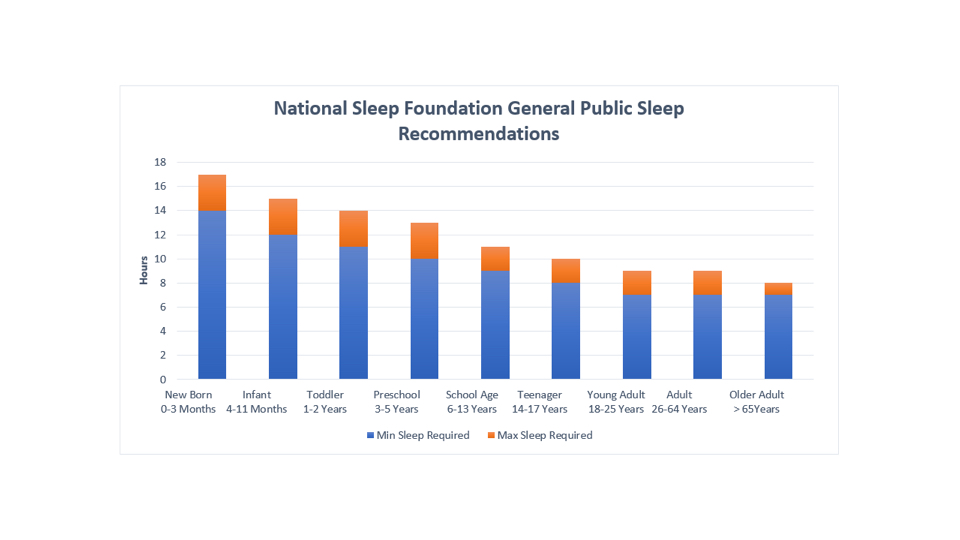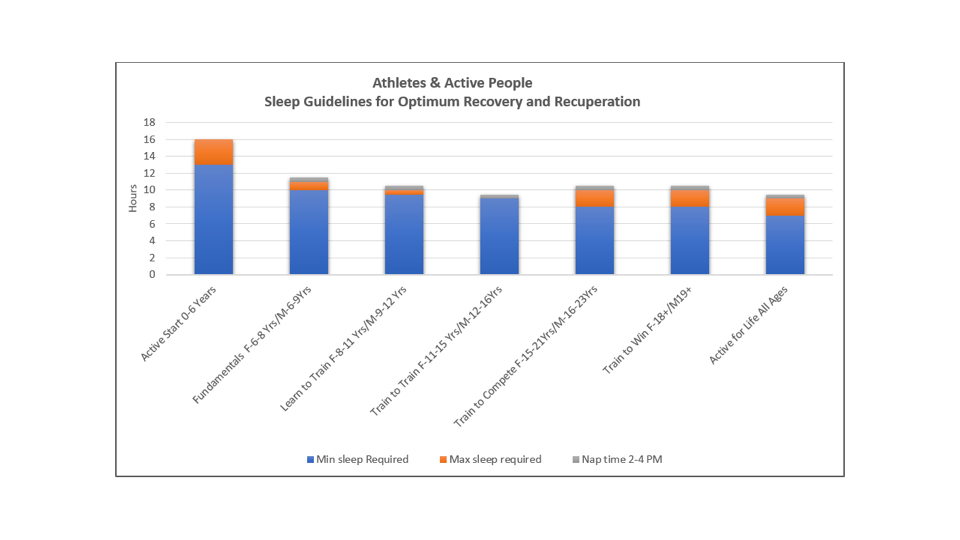Are you getting enough sleep?
Is your spouse getting enough sleep?
Are your kids – your co-workers – your friends – your athletes – are they getting enough sleep?
I only ask this because it may be the most important question I can pose.
You see the amount of sleep you are getting and the quality of your sleep impacts every aspect of your life.
It is estimated that 6o percent of adults are not getting enough sleep.
Recent surveys show we are averaging 6.9 hours of sleep a night which is well below the recommended 8 hours. Research also indicates that 30 percent of adults are getting less than 6 hours of sleep a night and 40 percent of children are not getting enough sleep. This not only impairs growth and development but their ability to learn.
In the health and performance world there are strong links between sleep and brain function as well as mental health and obesity. Sleep also has strong links to colds and flu, heart disease, performance at work, sport performance and injury rates.
To give you an idea of how missing sleep might impact you and those around you, here is some compelling sleep data:
- After only one night without sleep our ability to memorize word lists drops 40 percent.
- After a night of quality sleep memory improves 20 – 30 percent
Virginia Tech researchers did a study on what causes car crashes. They allowed subjects only 4 hours of sleep for 5 nights. Researchers were stunned to find a cumulative impairment in the subjects’ ability to think fast, to react quickly and to remember things. This started immediately upon missing the first period of sleep. The study also points out that when driving 60 miles per hour it only takes 2 seconds to drift into the opposite lane and 4 seconds to take you off the road. The researchers found that “Lapses” can occur quite early in a sleep deprived state and can occur even when people have their eyes open.
Not sleeping for 20 hours is the equivalent of having a blood alcohol level of 0.08 percent- well over the limit where a driver is classified as legally impaired.
Food or Sleep?
Starvation is fatal in two weeks but sleep deprivation has been shown to be fatal in only 10 days!
Humans are the only mammals on the planet who self induce a sleep deficit.
Every Performance Program should start with Rest and Recovery and your Rest and Recovery strategy should start with one question: How much sleep do you Need.
How Much Sleep do you Really Need?
The National Sleep Foundation Recommends the following guidelines:
For athletes and active people, due to the extra stress of training and competition, Canada Sport for Life has ingenuously set age related Sleep Guidelines for optimum recovery and recuperation:

When we work with our athletes and top performers from all walks of life – be it the business executives, students, musicians, coaches, moms and dads – the first question we ask is, “what’s your sleep schedule?”
We know that you can’t perform at an optimum level if you are sleep deprived so every performance program and strategy starts with the amount of sleep you need on a nightly basis. Once sleep requirements are established we begin to build the performance plan by day, week, month and for some even years.
We also know that there are many circumstances that may lead you to lose sleep. So, should you be worried about how much sleep you are getting or not getting on any given night – no not at all. Missing a few hours of sleep on one or two nights is very manageable.
Here’s a great strategy you can use to make your sleep management easy: Block your Sleep.
Take your nightly amount of recommended sleep and look at it from a weekly perspective – a weekly block of sleep. For example, if you require 8 hours of sleep in a night, over 7 nights you will need to get in 56 hours of sleep. If you find yourself missing a few hours here or there, no problem, make it up by adding a few extra hours of sleep the following night or plan strategic naps. The end game is to get your 56 hours of sleep in over the course of the week.
Naps and Sleep Extension
Napping
This may be one of the best ways to keep your sleep strategy on track. For our performance programs we schedule a regular daily nap time whenever we can. But napping has to be done correctly.
How to nap like a pro.
Plan your nap time between 2:00 and 4:00pm. This is an optimal time to boost energy and alertness in order to finish the day strong and its early enough in the day not to interfere with night time sleep patterns.
Your nap should only be 15 – 30 minutes in length. This can vary from person to person so you may need to experiment to find out what works for you. If you find you have extended grogginess or disorientation after your nap, a condition called Sleep Inertia, you may want to adjust the time of your nap and/or the length of your nap.
A good nap can be all powerful. In fact a NASA nap study on military pilots and astronauts revealed that a 40 minute nap improved observed performance by 34 percent and alertness by 100 percent.
Sleep extension
This is another strategy for boosting performance. Its very simply…plan for more sleep.
If it is recommended that you should be getting 8 hours of sleep, plan for 10, this strategy for sleep management can also be very powerful.
The benefits of sleep extension have been shown time and time again by researchers at Stanford University. They increased the sleep periods of varsity athletes to at least 10 hours a night for a duration of 5-7 weeks. The extra sleep and rest resulted in personal best performances, faster sprint times, improved shooting accuracy and improved ratings of overall physical and mental well-being.
Naps and sleep extension strategies can be used by everyone. The important key here is to have your foundation set up in a daily and weekly sleep plan. Your foundation will provide the guidelines for you to make proper adjustments in your sleep strategies.
Could less sleep be contributing to the epidemic of obesity?
As we work to uncover the secrets of what exactly happens when we sleep it has been found that a lack of sleep has a major impact on how our bodies process and utilize food and energy.
Strong evidence has been found linking lack of sleep with increased weight gain and obesity.
In an important sleep study, healthy fit adults were only allowed 4 hours of sleep for 6 nights.
The Findings:
- Subjects were in a pre-diabetic state
- They were more hungry despite having plenty of food
- Glucose metabolism slowed 30-40%
All of which can result in increased fat storage
In this study subjects were on the road to diabetes in just six days. And that’s not all – they were also hungry. It has been shown in this study and many others since, that a lack of sleep plays havoc on hormones and hormone balance which directly impacts our body composition.
Tips for Better Sleep Tips
Strategies to help you get that good night sleep you need.
- Block your Sleep
Take your recommended amount of nightly sleep and put it together in a weekly block of sleep time. This way you don’t have to worry about missing an hour or two from day to day. Just remain focused on your weekly sleep goals.
- Set Your Routine
It is important to wake up and go to bed at consistent times each day, even on the weekends. Also, give yourself plenty of time to wind down and relax before bed. Reading in soft light with relaxing music can be very effective.
- Keep a Sleep Log
Write down the amount and quality of your nightly sleep. This will allow you to balance and plan your weekly sleep strategy. Keeping a detailed sleep log for a minimum of 10 days can reveal sleep patterns and habits that may be keeping you from getting a quality sleep.
- AVOID TECHNOLOGY!
Put the phones away! Yes, it has been shown that the light from smart phones and laptops can interfere with the onset of melatonin (the sleep hormone). But, it is the activity in the brain that may be even more detrimental to getting a good night’s sleep. So, shut down the texts, Candy Crush, Gods of War or whatever game you might be playing 2 hours before you go to bed – This is MANDATORY for all of our high-performance athletes.
- Environment
Make your bedroom a good place to be. Keep it cool, dark and comfortable. Invest in a good mattress and great pillows. No work desk, no television, no workout equipment. Your bedroom should be set up for only two things sleep and sex.
- Exercise
Regular exercise will help you sleep better but remember don’t exercise too close to your bedtime. And whatever you do DO NOT cut into your sleep to get in an early morning workout. – SLEEP IS PRIORITY #1!
Still having trouble sleeping.
If you are having trouble getting a good nights sleep whatever you do, DO NOT start to self medicate using sleep aids to sleep or stimulants to stay awake.
This often turns into a vicious cycle of sleep deprivation. If you are having sleep issues don’t hesitate to see your doctor or seek out a sleep professional
So, get your sleep. Get the right amount of sleep and the right quality of sleep.
I sometimes think it would be great to be like the dolphins, sleeping one half of their brain at a time, never really totally shutting down, imagine what we could do.
But then I think of the solidifying routine of going to bed at night and waking in the morning. I think of the comfort of my bedroom, my bed and the great feeling of getting a good night’s sleep – there is nothing quite like it.
Good Health and Top Performance for all.
Jeff





